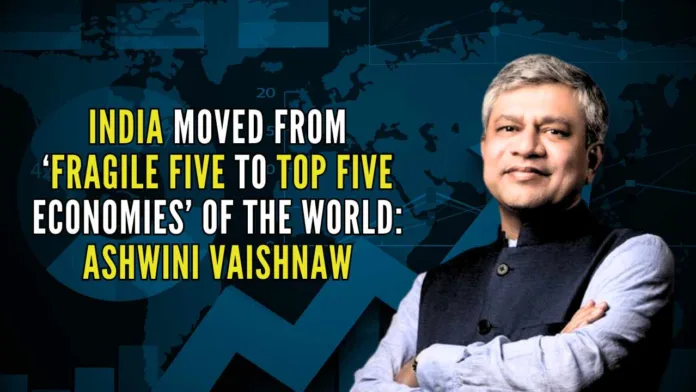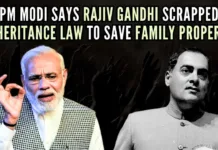
Ashwini Vaishnaw explains how Bharat saw expeditious growth in the past 10 years
On Saturday, Union Minister for Railways, Communications and Electronics & IT Ashwini Vaishnaw said that the country has moved from the ‘Fragile Five to Top Five Economies’ of the world and is now headed for another milestone.
The Union Minister was addressing a gathering at the Viksit Bharat Ambassadors meet-up program.
Vaishnaw summed up India’s growth journey in the last 10 years and explained what factors led to the expeditious growth, something that never happened in Congress-led United Progressive Alliance (UPA) eras.
He credited this to meticulous planning and focused execution, under the leadership of Prime Minister Narendra Modi.
“All this change didn’t happen automatically. A lot of effort, planning, and execution has gone into bringing this change. If this change was to happen on its own, it would have happened in the 1970s and 1980s,” he said.
The Minister said that four pillars have primarily driven this growth, which include Public investment in social & physical sectors, Inclusive growth, Simplification of goals, and Manufacturing push.
Elucidating the public investment and capacity building, he cited the example of his own ministry.
“Earlier, an average of 1050 kms of railway tracks were built in a year, that went to 5,300 kms of tracks in a year (equivalent to the size of Belgium, Austria, and Switzerland),” Vaishnaw told the audience.
“During the first 60 years after Independence, railway electrification took place on 20,000 km track, in last ten years alone, over 40,000 km track was electrified,” he added.
He also enlightened the Viksit Bharat Ambassador participants about the notable rise in the number of topmost institutions including AIIMs, IITs, and IIMs, and also their capacity to nurture talent over the past few years.
Underlining the government’s focus on inclusive growth, the Union Minister spoke on how ground-breaking initiatives like Swachchta Yojana and Jan Dhan accounts have brought a transformational change across the country.
Citing growth numbers, he said: “Over 10 crore free LPG connections were distributed under Ujjawala Yojana, 80 crore people are being provided with 5 kg foodgrains every month while 25 crore people have been lifted out of multi-dimensional poverty in past 10 years.”
Describing simplification as the third pillar of growth, he put forth examples of the Telecom sector and the Law department and said that a lot of endeavor and planning went into bringing the paradigm change.
“India’s telecom sector was governed by an Act enacted in 1985. Today, that has changed. It took two years to conceptualize, brainstorm, and enact the new Telecom law and today, that is giving us good direction and pace in the new-age world,” he explained.
Similarly, over 1,500 laws have been repealed over a period of time, but that didn’t happen overnight. It became possible because of meticulous planning and execution.
He further said that the change in mindset is one of the key reasons behind this paradigm shift.
“It’s because of our belief in indigenous production and faith in our own manpower that the country is scaling new heights of success,” he said while citing the example of the Chenab bridge, which is 100 feet higher than France’s Eiffel Tower.
He also said that the Modi government has consistently focused on manufacturing and capacity building.
“In 2015 itself, the Prime Minister envisioned to make India into a global manufacturing hub. Make in India was a key component of this vision. Today, the country is taking the lead in many similar areas including technology,” he said.
The Minister also heaped praise on the Prime Minister for reviving the country’s cultural consciousness and said that they form an important constituent of a strong nation.
“Taking pride in our own culture is something we realized in NDA tenures. Earlier, we were made to look down upon us but that must change if we have to ride ladders of success,” he pointed out.
For all the latest updates, download PGurus App.
- CM’s post in buzzing capital like Delhi not ceremonial, office holder has to be available 24×7: Delhi HC observes - April 29, 2024
- Amit Shah’s doctored video case: Delhi Police summons Telangana CM Revanth Reddy, other Congress leaders - April 29, 2024
- Smriti Irani files nomination from crucial Amethi seat; holds massive roadshow ahead of filing her nomination papers - April 29, 2024










